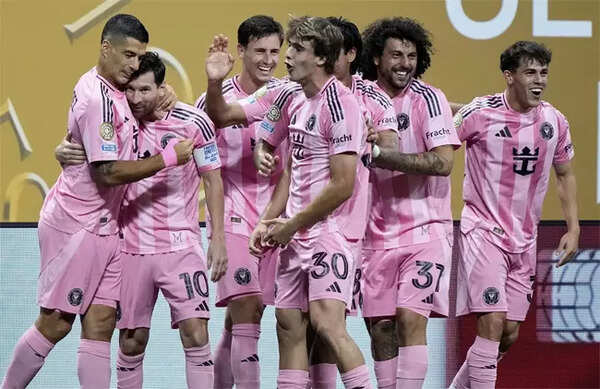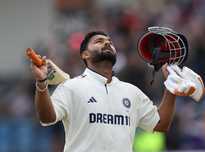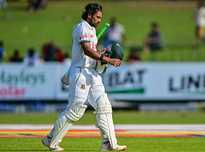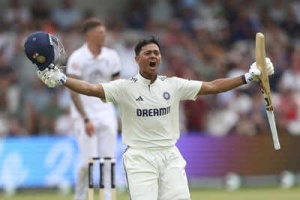The FIFA Club World Cup 2025, in its revamped format, has delivered a compelling narrative as it progresses towards the Round of 16. With an expanded field of teams, a redesigned trophy, multiple host cities, and the introduction of innovative features like referee cams, the tournament in the United States is drawing parallels with the prestigious quadrennial World Cup.
Organizers have hailed the event as "a celebration of hope, excellence, and pride," uniting clubs, players, and fans through their shared passion for the sport. The inclusion of several debutantes and the extended month-long duration have significantly elevated the competition's profile.
Featuring teams from all six confederations – 12 from Europe, 6 from South America, 4 each from Africa, Asia, and North, Central America and the Caribbean, 1 from Oceania, and the host nation representative – the 2025 edition has been marked by unexpected results, David vs. Goliath encounters, and intense moments both on and off the pitch.

Auckland City, ranked 4,971st in the Opta Power Rankings, entered the Club World Cup as the lowest-ranked team. They found themselves in a group with powerhouses like Bayern Munich, Benfica, and Boca Juniors. The team, comprised of amateurs from New Zealand's Northern League, faced a daunting challenge.
Auckland City suffered a heavy 0-10 defeat against Bayern Munich, the largest margin in the tournament thus far, followed by a 0-6 loss to Benfica. However, in their final match against Argentinian giants Boca Juniors, Auckland defied expectations. Despite a staggering 4,819-point difference in rankings and Boca's storied history, the amateurs secured a 1-1 draw, denying Boca Juniors a place in the Round of 16.

Lionel Messi's Inter Miami, competing in a group alongside Porto, Al Ahly, and Palmeiras, defied expectations to secure a spot in the Round of 16. Led by Messi, and supported by former Barcelona stars Luis Suarez, Jordi Alba, and Sergio Busquets, Inter Miami finished second in Group A.
Despite securing only one win, it was enough to advance. After a draw against Al Ahly, Miami faced Porto. Messi's brilliance, highlighted by a stunning free-kick, led to a 2-1 victory. A 2-2 draw against Palmeiras sealed their place in the knockout stage.
The final matchday in Group E saw tensions escalate as River Plate needed a win to progress. Inter Milan, however, dashed their hopes. After the final whistle, River's Marcos Acuna and Inter's Denzel Dumfries nearly engaged in a physical altercation, requiring intervention from both teams' personnel. The rivalry, stemming from the 2022 World Cup quarter-final where Argentina defeated the Netherlands, added fuel to the fire.
Beyond player confrontations, extreme heat also impacted the tournament. Teams resorted to ice baths and cold towels to mitigate the effects of the weather. Borussia Dortmund even had their substitutes watch the game from the locker room to shield them from the heat. Thunderstorms caused delays in multiple matches.
Adding another layer of complexity, U.S. Immigration and Customs Enforcement (ICE) and Customs and Border Protection (CBP) maintained a presence at the tournament, requiring non-citizens to provide proof of legal status to attend games.
With the 2026 FIFA World Cup, co-hosted by the United States, Mexico, and Canada, less than a year away, the Club World Cup has raised several concerns. Issues ranging from pitch quality to extreme weather conditions have marred the tournament.
Real Madrid's Jude Bellingham criticized the pitch conditions, stating, "The pitches aren’t great here. The pitches aren’t great at all."
Despite the emergence of underdog stories and unexpected results, the Club World Cup continues to be dominated by European powerhouses. Teams like Real Madrid and Manchester City remain strong contenders for the title.
Newer articles
Older articles
 Emma Raducanu Shuts Down Carlos Alcaraz Dating Rumors, Confirms US Open Mixed Doubles Partnership
Emma Raducanu Shuts Down Carlos Alcaraz Dating Rumors, Confirms US Open Mixed Doubles Partnership
 Woakes Regrets Umpiring Decisions as India Seize Control on Day 1 at Edgbaston
Woakes Regrets Umpiring Decisions as India Seize Control on Day 1 at Edgbaston
 Club World Cup 2025: Upsets, Messi Magic, and World Cup Warning Signs Emerge From Group Stage
Club World Cup 2025: Upsets, Messi Magic, and World Cup Warning Signs Emerge From Group Stage
 Rishabh Pant: Revolutionizing Cricket with Unconventional Batting, Says Greg Chappell
OR
Greg Chappell Hails Rishabh Pant as Cricket's "Reinventor"
Rishabh Pant: Revolutionizing Cricket with Unconventional Batting, Says Greg Chappell
OR
Greg Chappell Hails Rishabh Pant as Cricket's "Reinventor"
 Mirabai Chanu: Olympic Medalist's Relentless Training Regimen Extends Even to Family Time
Mirabai Chanu: Olympic Medalist's Relentless Training Regimen Extends Even to Family Time
 Najmul Hossain Shanto Resigns as Bangladesh Test Captain After Sri Lanka Series Defeat
Najmul Hossain Shanto Resigns as Bangladesh Test Captain After Sri Lanka Series Defeat
 Black Caps Primed for Blockbuster Home Summer Against Cricket Giants
Black Caps Primed for Blockbuster Home Summer Against Cricket Giants
 Gujarat Cricket Association to Debut T20 League in 2025-26 Season
hoặc
Gujarat Cricket Gears Up for New T20 League Launch Next Season
Gujarat Cricket Association to Debut T20 League in 2025-26 Season
hoặc
Gujarat Cricket Gears Up for New T20 League Launch Next Season
 Jaiswal Aims to Eclipse Gavaskar's 49-Year-Old Record as India Battles England in Edgbaston Test
Jaiswal Aims to Eclipse Gavaskar's 49-Year-Old Record as India Battles England in Edgbaston Test
 Rishabh Pant's "Game-Changing" Centuries vs. England Earn Praise From Greg Chappell
Rishabh Pant's "Game-Changing" Centuries vs. England Earn Praise From Greg Chappell